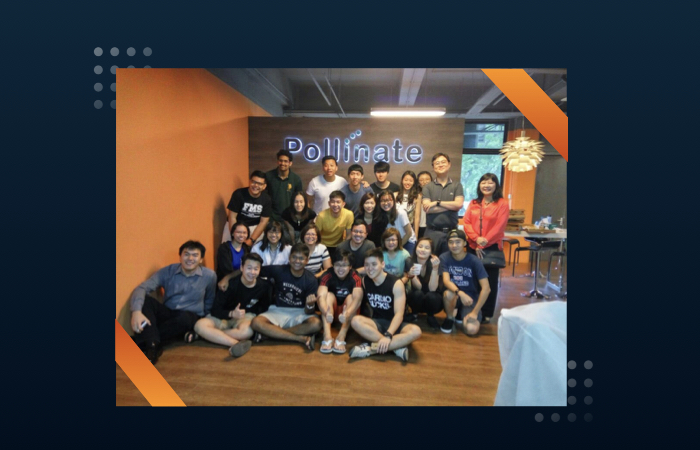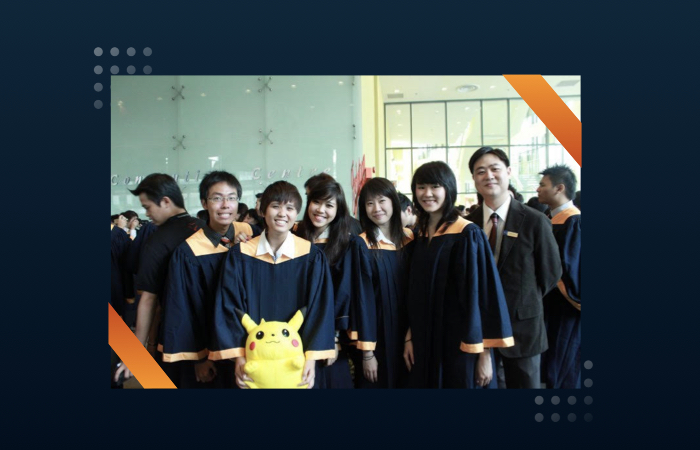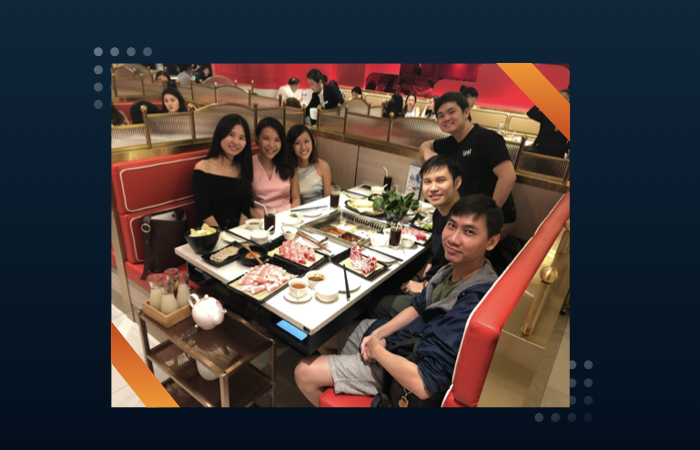by Kai Xin Koh | Dec 16, 2020 | Business, Expert Interviews, Lead With Stories Series
When change is the only given constant, the best skill you can equip yourself with for the workforce is adaptability. It makes you an invaluable asset to any company but many struggle with this for fear of going beyond their comfort zone. Read on as Patrice shares how stories can be used to inspire you to step out of your comfort zone.
Key actionable take-aways:
In this interview, Patrice illustrates how a great leader:
- uses stories to inspire action
- see opportunities for growth/improvement even during hardship
- regularly push themselves to go beyond their comfort zone
- is a visionary who guides their team to achieve their goals through a shared vision
What is the best piece of advice you have ever received?
When you give your team a sense of “being on a journey”, you give meaning and purpose to day-to-day activities.
In your opinion, what makes a great leader or storyteller?
In my years of leading teams of varying sizes, I came to understand that there are three elements that are necessary to move the hearts and minds of people. A good leader cares, inspires commitment and possesses conviction. This is not learnt in schools but is developed through the leader’s own personal life / work experiences. This is why, more often than not, behind every good leader, there is an even greater story.
“An unexamined life is not worth living” – Socrates.
This quote taught me the value of self-reflection to grow as a person. To this day, it continues to remind me the importance of setting aside time to reflect and draw lessons. Schools and various training programmes can teach the hard skills of a good leader but values, character and genuine growth, I believe, comes from self-reflection.

Each individual story has a struggle and opportunity. Learn to find the opportunity.
What would you say has been the greatest lesson so far as a leader in your work?
Opportunities lie in conflict. Opencerts was born because administrative officers spend countless hours working on manual certified true copies of certificates. When you talk to people and find out the stories, you uncover opportunities that would otherwise be ignored. A fresh graduate who struggled with the choice of working in an MNC or a startup, inspired the Startup Talent Factory initiative. A polytechnic graduate rejected by several commercial incubators ended up building a great company that inspired us to build Pollinate. Each individual’s story has a struggle and opportunity. Learn to find the opportunity.
What would you say was your greatest difficulty/sacrifice faced as a leader so far? How did you overcome it?
It is hard to pick one but I would say that one quality I have realised is critical for growth is to learn to step out of your comfort zone. One of my greatest challenge was when I was asked to form the innovation and entrepreneurship office of NP, called The Sandbox. I am an educator and technologist at heart and definitely not an entrepreneur. It was a daunting task and I felt inadequate. Five years later, that office received numerous awards for the many national-level initiatives it kick-started, including the Public Service Transformation award for Exemplary Innovation.

Public Service Transformation Awards (Exemplary Innovation)
This is what I learnt from that experience:
- Learn from others. I had a talented team that taught me what I needed to know about innovation and entrepreneurship. I’ve met with several entrepreneurs who talked me through their entrepreneurship journey.
- Dare to try something new and fail. We’ve launched over 50 initiatives during my 5 years at The Sandbox but most people would only listen to about 5 – 8 of the initiatives. Most failed. That’s part of the journey.
- Collaborate. We won’t have the resources and know-how to do things alone but together, you can create something meaningful.
- Move fast. Time is critical in this rapidly growing space. We are no longer in the “big fish eats small fish” world but the “fastest fish” wins.
How important are storytelling skills to you as a leader? How have you applied it in your work?
Almost every great initiative starts with a story:
The Untold Story of Pollinate
This is the story of Maxim. After Maxim graduated from Singapore Poly, he had an idea and a strong conviction that the market needs this idea and wanted to launch his startup. Armed with courage, he applied to several commercial and university-based incubators but was rejected by all. He persevered and rented a small office in an industrial estate and launched his business all on his own. Pollinate was created to provide Polytechnic graduates with a safe and familiar place to start and grow their business. It had three basic operating principles:
- Purely developmental and no equity
- Focused on poly grads and accept graduates from any polytechnics.
- 20% of the offices to be opened to startup founders outside of polytechnics.
To date, over 30 startups have cycled through Pollinate, and we’ve seen many grow in terms of revenue and team size. Three years later, he sold it for a profit. With the proceeds from the sale, he used it to fund a short course education at Stanford University. While at Stanford, he participated in a two-man hack-a-thon team where he met his future business partner. Together, they continued working on the hack-a-thon idea and launched Gtriip in San Francisco which later expanded to Singapore. If Maxim had gave up on his first idea after being rejected by several incubators, Pollinate or Gtriip may not be here today.

1st batch of Startups moving in
The Story That Inspired Startup Talent Factory
Meet Gladys. After graduating from SMU with a Bachelor in Business Administration, she applied to several positions, mostly in MNCs and a few startups. She received several offers which she was able to short list to two. A pharmacy company that offered a salary of about $4K+ and a startup company that offered a salary of $3k+ with 3% equity. She had a hard time choosing which offer to accept. Her parents and uncle were persuading her to accept the offer from the pharmacy company since it pays more and the company is more stable. She was leaning towards the startup but she doesn’t quite understand the 3% equity and the fact that she will receive a lower pay than her peers. Eventually, she chose to work for the startup. There are many graduates out there, like Gladys, who may decide to work for the MNCs instead. We can’t blame them for their choices. It can be hard to compete especially salary-wise. This is where the dilemma lies. Startups constantly look for good talent but are often unable to afford the salary to compete with MNCs and they lose out on a potential hire. STF was conceived to help startups and the polytechnic graduates alike. To date, STF has successfully placed over 100 graduates to work in startups as a gap year programme post-graduation.
If you had to offer a piece of advice to someone just starting or who aspires to lead a team/organisation. What advice would you give?
1) Team bonding activities do not build teams. Vision builds teams. People need a vision to anchor their efforts, give meaning to their work and provide a sense of direction towards their destination. 2) Be wary of lots of Motion without Movement. Some call it: Hentak kaki or marching in place. Lots of motion without movement. We need to ensure that every effort is directed towards the vision, and is moving the team closer to its destination.
Share with us something you learned recently that changed how you intend to run your team/business.
The importance of human connection. We can teach via Zoom, meet over Skype and chat on Messenger but human connection brings elements of serendipity that often is the spark that creates value.

Staff Excellence Award (Innovation Award)
What are 3-4 tools (digital or offline) that you feel everyone should know about?
Design a Powerpoint deck (design skills) Tell a good story (communication skills) Write a Project Proposal (writing skills) Ace your spreadsheet (data skills)
Now more about Patrice’s backstory:

A picture of Patrice with his mentees during graduation
What’s your story?
I am an educator and technologist who is passionate about creating value through innovation. I’ve always had a thirst for learning even when I was young. During my ‘O’ levels, I wanted to take 9 subjects but the maximum that I was allowed to take in school was 8 subjects, so I took an extra subject as a private candidate. I learned the BASIC programming language at 13 years old just so I can hack into the SNAKE.BAS game that came with MS-DOS. I subsequently picked up other languages and wrote my first database-driven application in DBASE III at 16 years old. I completed my M.Comp in 2007/8 and M.Ed in 2012/13. Today, I teach tech to diploma students, adult learners and working professionals, and help companies innovate using technology.
How did you get into your current line of work/ why did you decide to do it?
I’m fortunate. I’ve never gone in for a formal work interview. In 2001, I completed my Honours thesis for Ericsson, a telecommunication giant at that time. Right after my thesis presentation, my supervisor called me to his office and offered me a job to work for Siemens R&D Labs in 3G research. I worked for Siemens for about three years till the R&D labs moved to China. I took the severance package to pay off my student loans and travel the world. I was 25 years old then. A friend of mine asked me to teach Java as a part-time lecturer in NP as the faculty needed some help. I accepted. One semester later, I was offered a full-time position. 16 years later, I’m still doing what I enjoy: teaching about technology and innovation.
How can people connect with you?
Linkedin or email me.
by Kai Xin Koh | Nov 16, 2020 | Business, Expert Interviews, Lead With Stories Series, Leadership, Storytelling
Success is not dictated by the hard work of one person alone. A great leader is also a great story-teller because effective communication is the foundation of any successful organisation. Read on as Val shares how communication is a vital part of their company culture.
In this interview, Val reflects and illustrates how a great leader:
- Is being able to guide your team to move forward with sincerity, enthusiasm and willingness to take on the risk of decision making
- Inspire and motivate because inspiration is contagious
- Guides the team in exploring and figuring out ways to solve the problem to achieve the desired results
- Communicates and be present
- Plans ahead instead of having a reactive approach to things that are coming
- Is open and vulnerable
How important are storytelling skills to you as a leader? How have you applied it in your work?
Storytelling is a great way to communicate with all the different stakeholders, from investors to customers and even the team!
To investors, I have to illustrate how our product has evolved from the start and what I have envisioned for the future.
To customers, I narrate the story of how we add value to their lives and how we can help them to make better financial decisions.
To employees, I use storytelling to explain organisational and directional changes. It may be difficult for them to understand why we have to re-strategise due to changing circumstances and try new ways, but storytelling helps me to give real-life examples that everyone can understand and relate to.

Val Yap speaking at the AMTD booth during SFF 2019
How did you approach marketing your business/self so that customers know you’re different?
“Your most unhappy customers are your greatest source of learning,” says Bill Gates, founder of Microsoft.
If you think of every customer complaint as an opportunity to improve, then you will be able to handle those that come later much better. We strive to provide exceptional customer service especially for insurance coverage claims. This is to ensure that our customers feel secure and safe with our services.
We have been constantly working on the insurance vertical since its inception four years ago and our customers value our continuous dedication to making insurance affordable and accessible.
We are the first to introduce a single touchpoint for all our customers’ insurance matters. In fact, our first life insurance customer has been a loyal user for the last three years and has been managing his family’s insurance policies from the app. He found our app to be useful especially when he needs to check their financial portfolio.
What would you say has been the greatest lesson so far as a leader in your work?
The greatest lesson I’ve learnt is to communicate and be present.
Communication is key to ensure that the other party is aligned with you and your ideas. However, that alone is not enough. It is also important to be present in the moment so you can quickly pivot because change happens and often, things don’t go as planned.
It is also important to engage with your team across different departments and listen to their concerns and ideas and be open to discussions. A successful long-term planning is not easy to come by when the world is constantly evolving so we need to keep re-strategising to stay relevant to meet the market’s needs.
For instance with COVID-19 impacting the world, I have to keep constant communication with my team to ensure that we are working towards the same goal and meeting our customers’ needs. With new news and regulations coming out everyday, we need to keep up to adjust to our customers’ changing needs.

What would you say was your greatest difficulty/sacrifice faced as a leader so far? How did you overcome it?
It is not easy to leave a stable job especially when I have to borrow for my university studies. Without the guarantee of a regular paycheck, I had to cut down on all my expenses and lived in a prudent manner.
Unfortunately, I had to tap into my savings in my first year of starting PolicyPal. The process of building a company and a reputation from zero is quite challenging but I was determined to change people’s lives, and ensure that families will have the protection they need when the time comes.
As a leader, you’ll regularly face situations where you need to get buy-in against the odds. How would you overcome a hurdle like this?
Open up to your team. This first step is probably the hardest. However, the only way is to be open to them and tell them the truth about what’s going on. I would align the team to our end goal, explain the current situation and why things have to be done a certain way, and clear any doubts or queries from the team. I have to reassure the team that we are working together to reach our goal and emphasize on teamwork.
In your opinion, what makes a great leader?
I think that being a great leader is being able to guide your team to move forward with sincerity, enthusiasm and willingness to take on the risk of decision making. A leader makes these decisions and takes risks knowing that if things don’t work out, they will be accountable to themselves and others.
“True leadership stems from individuality that is honest and sometimes imperfectly expressed…Leaders should strive for authenticity over perfection.” – Sheryl Sandberg.
Perfection is not possible in the real world and people do not usually respond to perfection. They follow authentic leaders who inspire and motivate because inspiration is contagious.
A leader is not just about providing solutions to the problems, but guiding the team in exploring and figuring out ways to solve the problem to achieve the desired results.

Val’s volunteer outreach trip to Nepal before founding PolicyPal
What is the best piece of advice you have ever received?
The best piece of advice I’ve received is to find like-minded people and invest time in the community!
It is incredibly helpful to have a women support group whom you can share your experiences with and get advice from. The kind of support that comes from finding others in similar situations helps with the isolation I feel in this industry so I’m always happy to join such gatherings and events to share my experiences.
If you had to offer a piece of advice to someone just starting out or who aspires to lead a team/organisation. What advice would you give?
- People will treat you based on how you let them treat you.
- You have to work hard to get what you want!
- Don’t sit around and wait for things to fall in place, try different ways to reach your goals.
- When others see that you are a hustler, they will treat you with more respect!

PolicyPal Team dinner
What have you started trying this year that has been working well for you as a leader?
As a leader, I believe in having discipline. Discipline comes down to focusing on the right thing, which means you need to be crystal clear on what your success looks like and how to measure it.
Starting this year, I set aside half a day each week where I allow myself to concentrate and think about the business growth. I found this to be extremely important to plan ahead instead of having a reactive approach to things that are coming.
Share with us something you learned recently that changed how you intend to run your team/business.
I started writing reflections of my day and sharing it with our leadership team and this has helped them understand my daily wins and challenges. I believe that opening yourself up to others and being vulnerable is actually a sign of courage and self-confidence in a leader.
Our team members can, likewise, open up and share with each other and this keeps communication channels flow more smoothly. Empathy leads to understanding and imparts a healthy communication flow.
What are 3-4 tools (digital or offline) that you feel everyone should know about?
Notebook, I’m old school and still bring my notebook to meetings and it helps to keep me in check on the items discussed and I will not be distracted by emails and slack messages that are coming in.
Google Calendar is good for organising my personal and work schedule. I block out time slots for regular catch up with team, meditation and workout!
Google Alerts allows you to track our online presence, stay updated on our competitors’ activity, as well as get updates on different topics. It is free and easy to use. You can set up a number of alerts by nominating keywords and updates will be delivered directly to your inbox. You can even choose how often you want to receive them. It is surely more efficient than spending time browsing the web.
Now, more on Val’s backstory:

Val with Roy Teo (former Executive Director, Financial Centre Development & Advisor, Singapore FinTech Festival) at Japan Fintech week in 2018
What’s your story?
I worked as a Risk Assurance Consultant for PwC in London right after graduation. After that, I went on to become the Assistant Vice President for OCBC Bank in Singapore. We focused on launching digital campaigns, and worked closely with wealth management and marketing to drive innovations.
I was recently named into Forbes “30 Under 30”’s list for Finance and Venture Capital and currently, I am a Fellow at Singapore University of Social Sciences. I am also a frequent speaker on digital media and business management at universities and conferences.
Having been a sales broker at Allianz, I became very passionate about making financial planning affordable and accessible to everyone. This has led me to start PolicyPal, Asia’s leading insurtech firm. As the CEO and Founder, our goal is to help people understand their various insurance needs and empower everyone to take control of their financial future.
In 2019, I wrote a book, Balls Inc., where I shared the struggles and successes I’ve faced in my journey as a solo female founder in the tech industry. The book aims to encourage women who are hesitant to enter the tech startup ecosystem and hopefully, learn from my experience and better equip themselves!
When not at work, I’m an avid globe-trotter and a sports enthusiast.
How did you get into your current line of work/ why did you decide to do it?
The idea behind PolicyPal came about when my family encountered a series of adversaries. My mother was diagnosed with cancer and the insurance company rejected our application for a claim, as the policy was re-incepted after it lapsed for a short while. In that same year, my father had a sudden heart attack and unfortunately passed away.
Our family had to handle insurance matters twice and this made us realise the importance of insurance and proper financial planning.
PolicyPal was born in 2016, where we built a digital platform to enable individuals and families alike to understand and manage their insurance better. Today, we are a licensed insurance broker with over 30 global insurance partners to help consumers and SMEs have better access to affordable insurance.
How can people connect with you?
Linkedin or email











